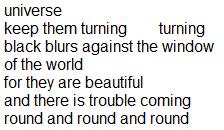Blessing the Boats: New and Selected Poems 1988-2000 by Lucille Clifton. Boa Editions. 132pp. $15.00
As Reviewed By: Justin Quinn
Lucille Clifton came to prominence in the Black Arts movement in the late 1960s, but this selected poems covers a less dramatic period as the poet moves into middle- and then old-age. As in the careers of most poets as they progress, elegy is evermore present, as well as the themes of illness, childhood reminiscence, as well as poems for and about children. Another important strand of her work treats of themes such as feminism and sex through the lens of mythological personae. However, she remains preoccupied with issues of negritude and race, and the social injustice still attendant upon these in the United States. The poetic style of the book is more or less uniform throughout: free-verse lines that range between one and three stresses; extensive use of dramatic monologue and autobiographical anecdote; and her chosen orthography removes all capitalisation.[private]
Succeeding generations of African-American poets are disassociating themselves from the Black Arts movement as it fostered a careless attitude to the craft: reading Clifton, one feels that such distancing is justified. African-American poetry has never, even to the present day, enjoyed the same attention as has the music and the novels, and this is perhaps because the poets themselves have not been able to situate themselves satisfactorily either within or without the Anglophone tradition. Was Gwendolyn Brooks really kow-towing when she wrote sonnets? Was she really innovative when she stopped? African-American poets unfortunately never seemed to pose the right questions so that their art could prosper, and the result is that they still feel that they must engage in a kind of boosterism, a boosterism which would be unnecessary if the achievements were significant. (For instance, the recent collection of essays and interviews The Furious Flowering of African-American Poetry, ed. Joanne V. Gabbin [UP of Virginia, 1999]). The result of their stylistic uncertainties is that many have fallen into the present period style, a good example of which is Clifton’s “photograph”, which is subtitled “my grandsons / spinning in their joy” and which I give in full:
Other than the mention of the blackness of the grandsons, this poem could have been written by any of a few hundred poets of any ethnic background in the U.S., Britain or Ireland. The theme is how wonderful one’s relations or lovers are, and how vulnerable is this beauty in an inimical world. The conclusion is a slight sigh of despair and foreknowledge. There is nothing wrong with this theme per se, but what is dismaying is the uniformity of its treatment in so much contemporary poetry. Clifton’s work, including those poems which deal with the themes I listed above, fits comfortably into this context, effecting a seamless stylistic assimilation into the verbiage of the ubiquitous second rate.[/private]






